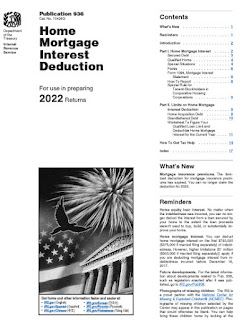A Tax Court Summary Opinion of June 26 on the mortgage interest deduction for 2019 when the taxpayer's aggregate mortgage debt on their principal and second homes exceeded the debt limit included a subtle reminder about the role of IRS publications to support positions taken on tax returns. [McNamara, TC Summary Opinion 2023-22 (6/26/23)]
The taxpayer's second home was only owned for 5 months of the year but in calculating the allowable mortgage interest deduction, performed the calculation as if owned 12 months. The taxpayer said they relied on IRS Publication 936, Home Mortgage Interest Deduction. The court relied on IRC Section 163(h) and related regulations, which it found "unambiguous" in determining the deduction as the IRS determined.
In noting that reliance on the IRS publication was "misguided," the court added: See Miller, 114 TC 184, 195 (2000) which explains "that administrative guidance is not binding on the Court when the plain meaning of a statute is clear." But the court did not include the quote on page 195 of that case. Here is is:
"Well-established precedent confirms that taxpayers rely on such publications at their peril. Administrative guidance contained in IRS publications is not binding on the Government, nor can it change the plain meaning of tax statutes."
A few observations and reminders about what can be relied upon to take a position on a return:
- IRS Publications, as well as tax forms and instructions, are not intended to be binding tax law interpretations or rules. They exist to help taxpayers better understand the law and comply with it. However, they might not present all possible rules and scenarios. Binding guidance is the IRC, regulations, and court cases (other than TC Summary Opinions which are not legally treated as precedent).
- Why did the Tax Court use the term "administrative guidance" in referring to a publication? I think it is because the word "guidance" is commonly used (and misused). Personally, I prefer to use the term "IRS information" when referring to non-binding items from the IRS such as publications, websites and FAQs (unless the FAQs were released as an Information Release (IR) and Fact Sheet). A better use of "administrative guidance" would have been for anything published in the weekly Internal Revenue Bulletin (IRB) such as regulations, revenue rulings, revenue procedures, notices, and announcements. While only final and temporary regulations are binding on taxpayers and the courts, taxpayers need to be aware of all items in the IRB and if they decide anything is incorrect and they don't plan to follow it, they should have a strong argument and likely it is a good idea to include a Disclosure Statement with the return (Form 8275 or 8275-R).
- Binding guidance to avoid a penalty such as under Section 6662 or 6694 that can be relied on for taking a position on a return (after weighing all relevant binding guidance).
- Binding guidance to avoid a penalty but not precedential for the taxpayer such as a PLR or TC Summary Opinion. For example, the taxpayer can't say they are taking a position per PLR XXXX (unless it was issued to them).
- Non-binding information from the IRS

No comments:
Post a Comment